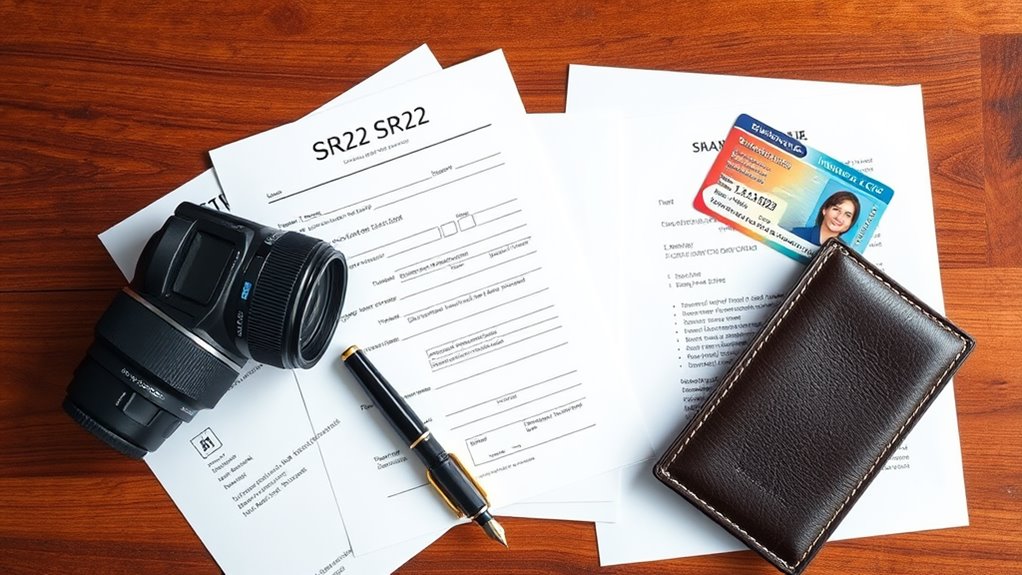2025-03-14
5 Key Factors Influencing SR22 Timeframe

Imagine you've just received an SR22 requirement after a DUI conviction. This situation highlights the complexities of SR22 timeframes, which can vary greatly based on factors like the type of violation and your state's regulations. Understanding these influences is essential, especially since non-compliance can lead to severe penalties. What are the specific criteria that determine how long you'll need to maintain this status? Let's explore the key factors that shape your SR22 obligations.
Key Takeaways
- The type of violation committed, such as DUI or reckless driving, significantly influences the SR22 duration required by states.
- State-specific regulations dictate varying SR22 timeframes, with some states mandating longer periods for repeat offenses.
- The frequency of infractions impacts SR22 requirements; multiple violations typically result in extended durations.
- Continued compliance with insurance coverage is essential, as lapses can lead to longer SR22 periods or penalties.
- Legal mandates from the court can also extend the SR22 timeframe beyond standard requirements based on individual cases.
Type of Violation

When it comes to SR22 filings, the type of violation you've committed plays a crucial role in determining the timeframe and requirements for reinstating your driving privileges.
For instance, DUI and DWI convictions typically necessitate SR22 insurance to prove your financial responsibility, while reckless driving offenses also demand these filings due to their serious nature. It's important to note that SR-22 insurance can sometimes lead to higher premiums as insurers assess the risk associated with your driving history.
Driving without insurance is another key trigger, requiring SR22 to guarantee you're covered. Accidents causing damage while uninsured can lead to similar requirements.
Driving without insurance not only demands SR22 but can also escalate requirements after an accident causing damage.
Additionally, excessive traffic violations and repeat offenses heighten the likelihood of needing SR22.
Each of these violations not only impacts your immediate need for SR22 but also influences how long it remains in effect, shaping your path to regaining driving rights. Furthermore, Decentralized Finance (DeFi) regulations can have parallels in how different types of violations affect the severity of penalties and requirements for reinstatement, showcasing the importance of understanding the context behind each situation.
Duration Requirements by State
Understanding the duration requirements for SR22 filings is essential, as they vary considerably across states and are influenced by the type of offense committed. Generally, you can expect SR22 requirements to last between one to three years, but specifics can differ.
- Alabama: Three years for most offenses.
- Florida: Unique FR-44 requirement for three years with higher coverage.
- Arkansas: Two years for first-time offenses; longer for repeat violations.
Each state has its own regulations, and factors like multiple offenses or court mandates can extend this duration.
Being aware of these variations helps you navigate your responsibilities effectively and avoid penalties. Always check your state's specific guidelines to guarantee compliance.
Frequency of Infractions
Frequent infractions can markedly impact the duration and necessity of an SR-22 filing, as they often indicate a higher risk to insurers.
If you accumulate multiple DUIs, driving without insurance, or reckless driving violations, you're likely facing longer SR-22 requirements. Each additional offense not only extends the timeframe but also considerably raises your insurance premiums due to the perceived risk.
Minor infractions, like excessive speeding or numerous traffic tickets, can also lead to SR-22 requirements in states that enforce them.
Consequently, a detailed review of your driving record becomes essential, as insurers will reference it to determine your risk level and associated costs.
In this situation, the frequency of infractions directly correlates with both your SR-22 obligations and financial responsibilities.
Compliance With Insurance

Compliance with insurance plays a pivotal role in the SR-22 process, as it directly influences your ability to meet state requirements and maintain driving privileges.
Ensuring you have the right coverage is essential, as the SR22 form serves as proof of your financial responsibility. Insurance companies must notify the state if your SR22 policy lapses, which could lead to additional penalties.
Here are key points to remember:
- State regulations vary, affecting the duration of SR22 requirements.
- Continuous coverage is mandatory throughout the SR22 period.
- Failing to comply can result in serious consequences, including license suspension.
Staying compliant not only helps you avoid issues but also reinforces your commitment to responsible driving.
Additional Penalties and Consequences
When you fail to meet SR22 requirements, you face a range of additional penalties and consequences that can greatly impact your driving privileges and financial situation.
License suspension is a common outcome, along with reinstatement fees that vary by state. You'll likely see your insurance premiums soar, as being classified as a high-risk driver considerably increases costs.
Furthermore, registering your vehicle becomes problematic if your license is suspended. Legal consequences can escalate, possibly resulting in jail time for repeated offenses or extended suspension periods.
Additional fines and surcharges may apply, compounding your financial burden. Remember, your driving record will reflect SR22 status, which can affect future insurance rates and driving privileges across states.
Conclusion
Steering through the SR22 landscape can feel like walking a tightrope, but understanding the key factors at play can help you maintain your balance. By recognizing how the type of violation, state-specific requirements, and your driving history influence the duration of your SR22, you can better prepare for the road ahead. Staying compliant with insurance mandates and being aware of potential penalties guarantees you won't find yourself facing unexpected detours on your journey to regaining full driving privileges.